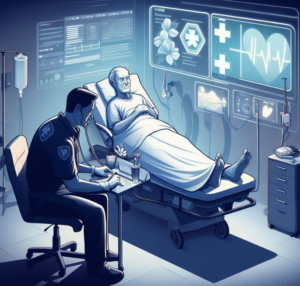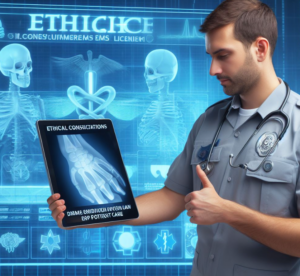 The significance of ethics within the field of Emergency Medical Services (EMS) cannot be understated. EMS professionals encounter life-altering situations a daily basis, requiring them to swiftly and reliably make decisions that uphold the welfare and dignity of the people in their care. Integrating ethical practices within the licensure of these professionals is less about their medical technicalities and more about their moral compass and ability to respond appropriately under duress.
The significance of ethics within the field of Emergency Medical Services (EMS) cannot be understated. EMS professionals encounter life-altering situations a daily basis, requiring them to swiftly and reliably make decisions that uphold the welfare and dignity of the people in their care. Integrating ethical practices within the licensure of these professionals is less about their medical technicalities and more about their moral compass and ability to respond appropriately under duress.
Ethical behavior in EMS extends beyond the immediate medical response; it encapsulates an enduring commitment to public service. It involves the practitioner’s devotion to ongoing education—keeping abreast of the latest in medical advances and ethical standards to provide top-tier care. EMS licensure is an assurance that practitioners have undergone rigorous assessment.
These practitioners are often the first point of contact in emergencies, acting as a bridge between life-threatening situations and hospital care. Their actions must reflect a balance between medical intervention and ethical sensitivity. They must be proficient at managing situations that involve legal rights, cultural considerations, and the individual choices of their patients. For instance, they must handle matters such as informed consent, confidentiality, and situations where patients might refuse treatment, all within the constraints of medical and legal protocols.
Holding an EMS license is essentially a badge of honor—it denotes a professional who is equipped with the advanced training necessary to deal with emergencies and who can be trusted to act with ethical integrity. It is the manifestation of a rigorous selection and training process that ensures these individuals are committed to the wellbeing of their patients and the ethical standards of their profession. Ensuring that EMS practitioners maintain an ethical approach aligns their actions with the complex demands of their role, fostering a healthcare system that is both competent and morally conscious.
Maintaining Ethical Standards in Patient Care
Ethical standards form the cornerstone of patient care in the Emergency Medical Services (EMS) system. Principles like beneficence, nonmaleficence, and justice are integral to the operational ethos of EMS providers. The application of these tenets ensures that the care delivered is focused on benefiting the patient, minimizing harm, and distributing healthcare resources fairly.
EMS providers frequently confront ethical dilemmas. The decisions they make in these critical moments, such as determining how to allocate scarce resources, obtaining consent in an emergency, or respecting do-not-resuscitate (DNR) orders, can have significant consequences. These complex situations require EMS professionals to balance the urgency of medical care with ethical considerations.
Cultural competence in patient care is another crucial aspect of upholding ethical standards. This component involves the recognition and respect of the societal diversity and individual ethical perspectives of the populations that EMS workers encounter daily. It is recognized that patient care goes beyond treating physical symptoms; it encompasses understanding and valuing a patient’s individual preferences, beliefs, and values. In fact, cultural competence is so essential that it’s woven into the licensure requirements for EMS professionals.
Ongoing education is paramount in fostering and improving the ethical decision-making capabilities of EMS providers. Through continuous learning and practical scenario training, EMS professionals can better navigate ethical complexities, thereby ensuring adherence to high ethical practices during each patient interaction. This continued professional development helps them to stay abreast of current ethical debates and situational challenges, ensuring that their practices are consistent with the latest in ethical standards.
The notion of patient autonomy takes on additional complexity in the pre-hospital environment. Given the nature of the emergencies, patients are sometimes incapacitated and unable to articulate their preferences. EMS practitioners must make rapid decisions with often minimal information available, leaning heavily on their training and ethical protocols to make judgments that respect the patient’s autonomy as much as possible. These circumstances underscore the necessity for clear ethical guidelines and frameworks that help guide EMS providers in making decisions that prioritize patients’ well-being and respect their rights to make choices about their own healthcare. This commitment to ethical excellence enables EMS professionals to provide high-quality care in all situations.
Ethics in the Evolution of EMS Care
 Emergency medical services (EMS) must continually adapt to advancements in medical technology and societal changes. This adaptation includes updating ethical frameworks governing licensure and practice. As the field progresses, it’s imperative for EMS providers to reflect on how innovations like new treatments and procedures might affect aspects such as patient welfare, consent, and privacy—all integral to ethical EMS practice.
Emergency medical services (EMS) must continually adapt to advancements in medical technology and societal changes. This adaptation includes updating ethical frameworks governing licensure and practice. As the field progresses, it’s imperative for EMS providers to reflect on how innovations like new treatments and procedures might affect aspects such as patient welfare, consent, and privacy—all integral to ethical EMS practice.
It’s the duty of EMS professionals to keep pace with these changes by integrating new knowledge and techniques that respect and uphold ethical standards. Doing so ensures their practices remain aligned with responsible ethical governance, thus serving the best interests of patients.
A critical issue facing EMS today is the integrity and confidentiality of patient data. With the frequent use of electronic systems for storing and sharing patient information, protecting privacy is a significant concern. Upholding high standards in data management must be a priority, and all EMS providers are ethically responsible for ensuring that patient information is handled securely and only used per explicit patient agreements.
The expanding responsibilities of EMS personnel bring forth delicate subjects such as end-of-life decisions, discontinuation of life support, and the provision of palliative care outside of hospital settings. Each of these decisions requires a nuanced ethical response that honors patient autonomy while considering the realities of pre-hospital emergency care.
By prioritizing ethics across all dimensions of their work, EMS professionals strengthen the community’s trust. This trust is essential, especially when individuals seek EMS services during exceptionally vulnerable times. A commitment to maintaining a high ethical standard is vital not only in protecting patient welfare and privacy but also in preserving the overall integrity of the EMS field. Ensuring a foundation built on ethical principles assures the public that their emergency care providers morally committed to delivering the highest level of care.
